TAL033-1: Assessment 1 - Critical Issue in the Airline Industry
VerifiedAdded on 2023/01/12
|6
|1300
|86
Report
AI Summary
This report examines the significant impact of technology on the airline industry, focusing on the influence of various technological advancements such as biometrics, cyber security, augmented reality, autonomous flights, and bio-fuels. The report delves into how these technologies affect air transport operations today, improving passenger experiences and operational efficiencies while also increasing costs. It analyzes how technology is transforming the industry, impacting customer experiences and operational aspects, with a look at future trends and changes. The report concludes that technology is crucial for managing the industry and improving customer services, with the potential to reduce costs and enhance operational efficiencies. The report references several books and journals to support the findings, offering a comprehensive overview of the topic.
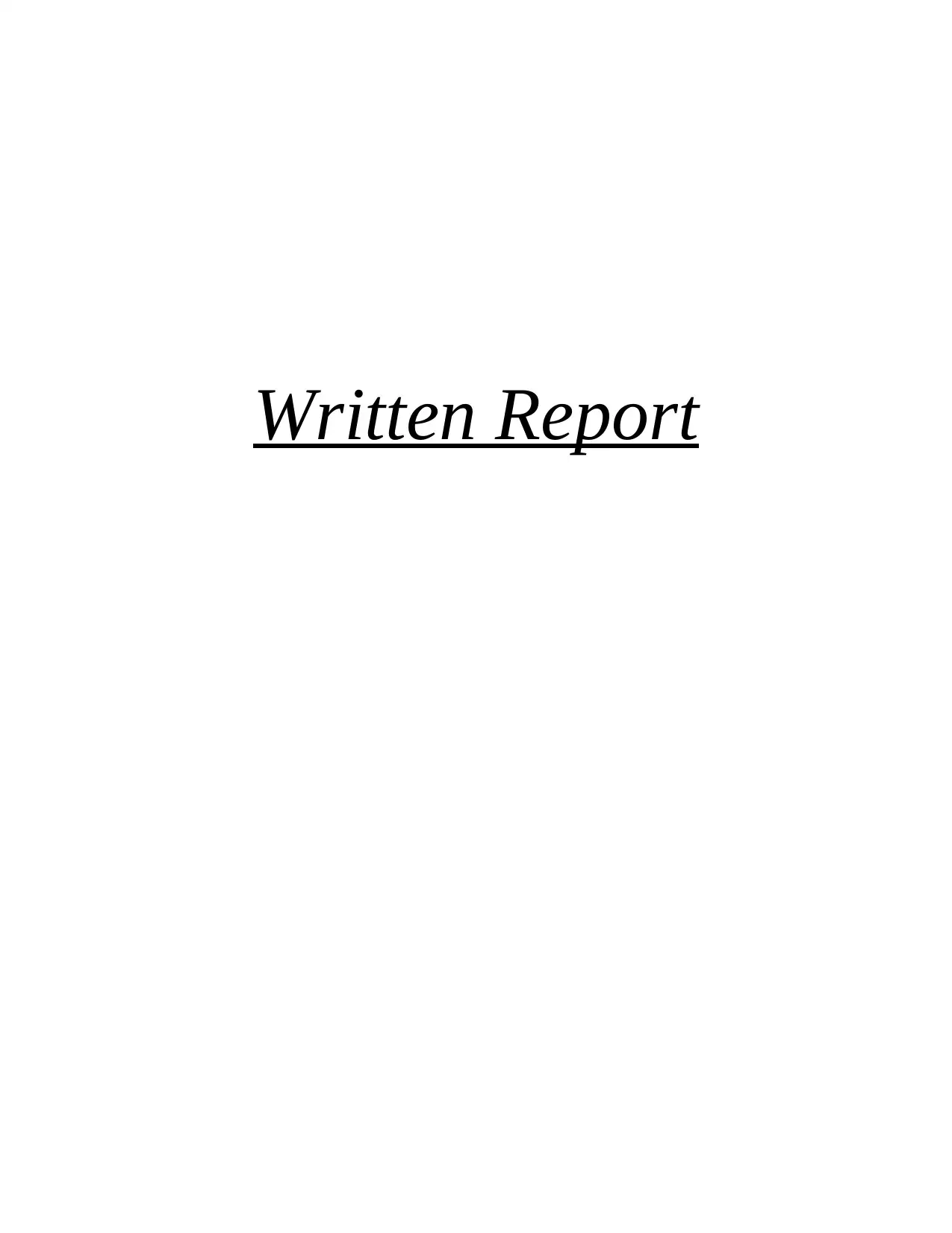
Written Report
Paraphrase This Document
Need a fresh take? Get an instant paraphrase of this document with our AI Paraphraser
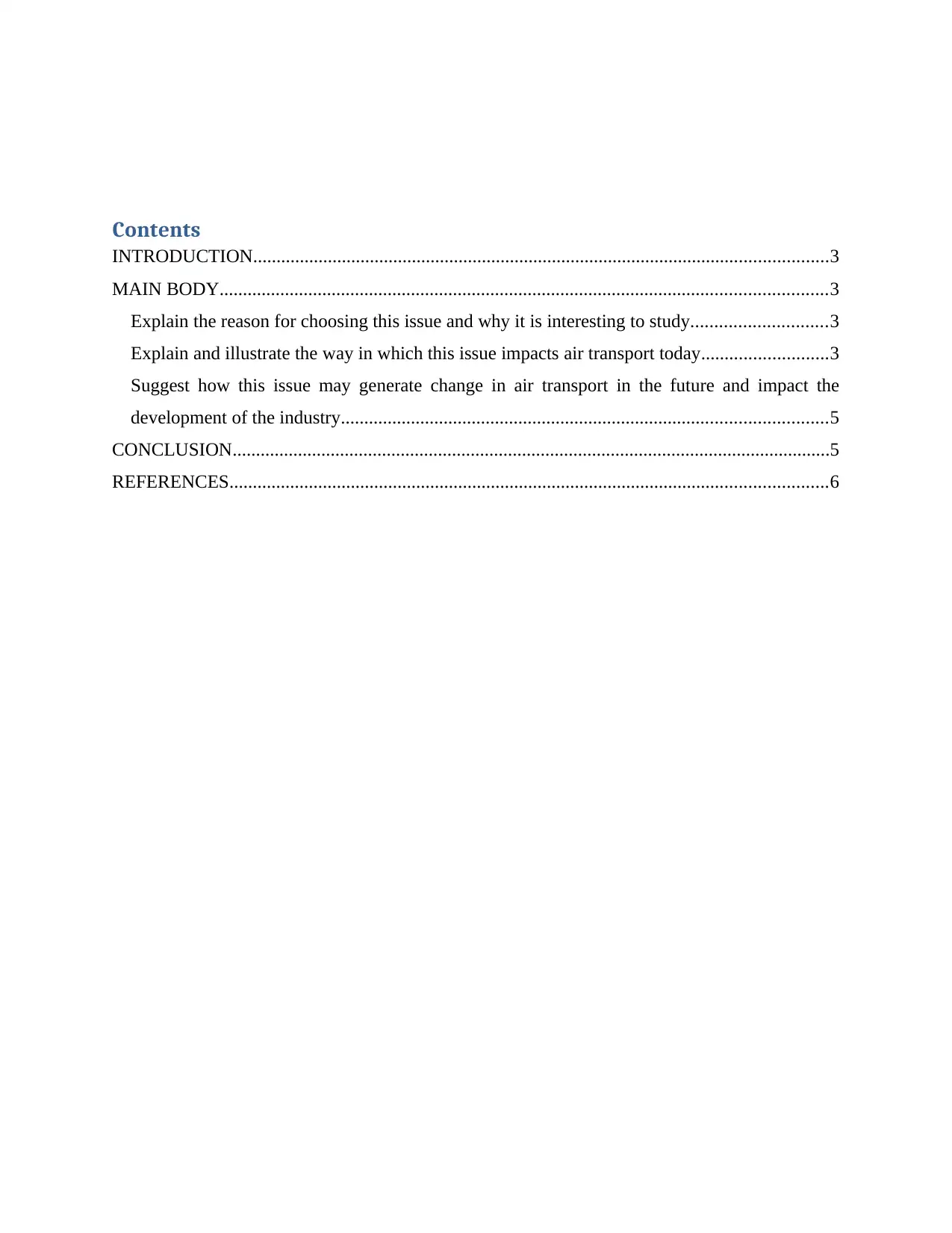
Contents
INTRODUCTION...........................................................................................................................3
MAIN BODY..................................................................................................................................3
Explain the reason for choosing this issue and why it is interesting to study.............................3
Explain and illustrate the way in which this issue impacts air transport today...........................3
Suggest how this issue may generate change in air transport in the future and impact the
development of the industry........................................................................................................5
CONCLUSION................................................................................................................................5
REFERENCES................................................................................................................................6
INTRODUCTION...........................................................................................................................3
MAIN BODY..................................................................................................................................3
Explain the reason for choosing this issue and why it is interesting to study.............................3
Explain and illustrate the way in which this issue impacts air transport today...........................3
Suggest how this issue may generate change in air transport in the future and impact the
development of the industry........................................................................................................5
CONCLUSION................................................................................................................................5
REFERENCES................................................................................................................................6
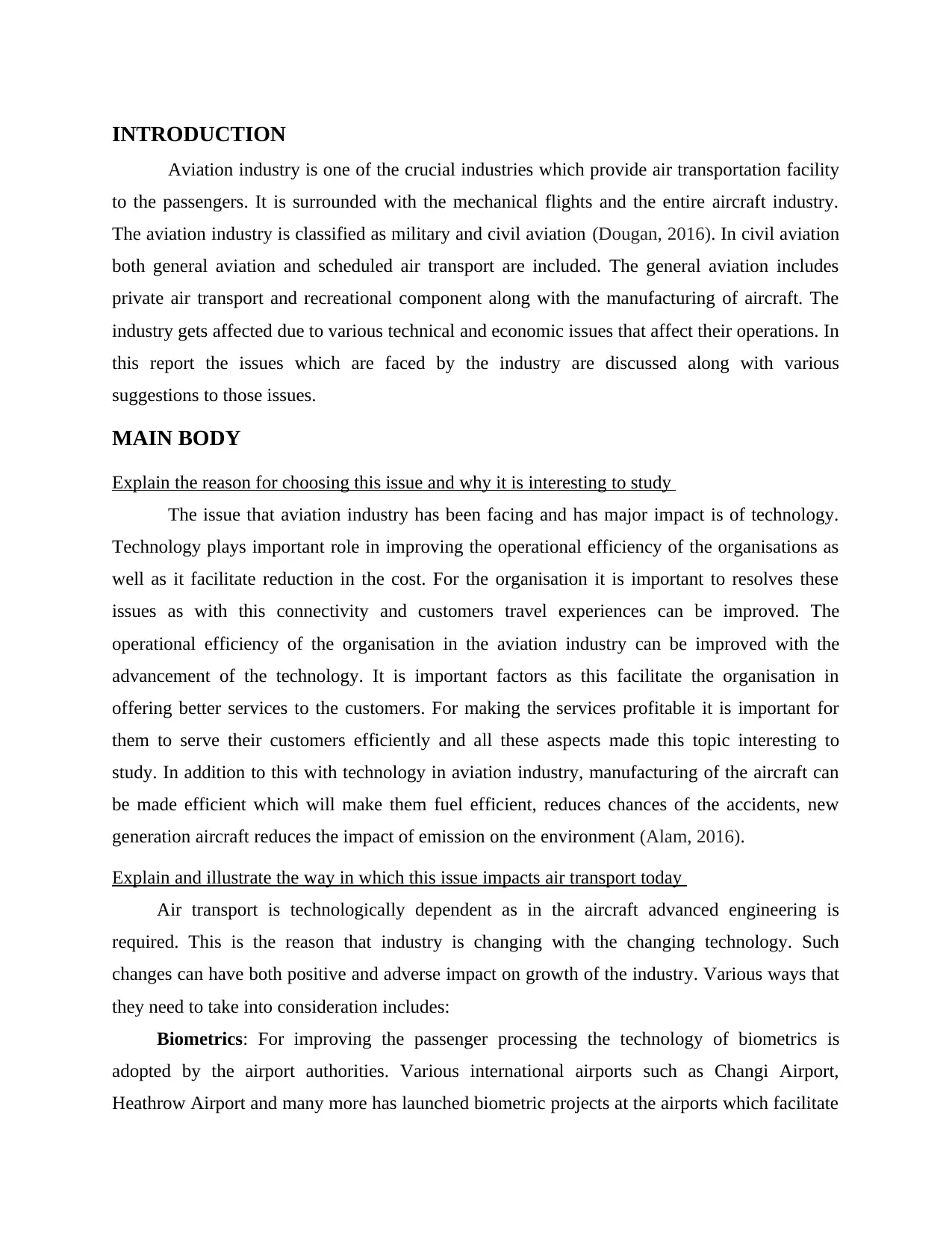
INTRODUCTION
Aviation industry is one of the crucial industries which provide air transportation facility
to the passengers. It is surrounded with the mechanical flights and the entire aircraft industry.
The aviation industry is classified as military and civil aviation (Dougan, 2016). In civil aviation
both general aviation and scheduled air transport are included. The general aviation includes
private air transport and recreational component along with the manufacturing of aircraft. The
industry gets affected due to various technical and economic issues that affect their operations. In
this report the issues which are faced by the industry are discussed along with various
suggestions to those issues.
MAIN BODY
Explain the reason for choosing this issue and why it is interesting to study
The issue that aviation industry has been facing and has major impact is of technology.
Technology plays important role in improving the operational efficiency of the organisations as
well as it facilitate reduction in the cost. For the organisation it is important to resolves these
issues as with this connectivity and customers travel experiences can be improved. The
operational efficiency of the organisation in the aviation industry can be improved with the
advancement of the technology. It is important factors as this facilitate the organisation in
offering better services to the customers. For making the services profitable it is important for
them to serve their customers efficiently and all these aspects made this topic interesting to
study. In addition to this with technology in aviation industry, manufacturing of the aircraft can
be made efficient which will make them fuel efficient, reduces chances of the accidents, new
generation aircraft reduces the impact of emission on the environment (Alam, 2016).
Explain and illustrate the way in which this issue impacts air transport today
Air transport is technologically dependent as in the aircraft advanced engineering is
required. This is the reason that industry is changing with the changing technology. Such
changes can have both positive and adverse impact on growth of the industry. Various ways that
they need to take into consideration includes:
Biometrics: For improving the passenger processing the technology of biometrics is
adopted by the airport authorities. Various international airports such as Changi Airport,
Heathrow Airport and many more has launched biometric projects at the airports which facilitate
Aviation industry is one of the crucial industries which provide air transportation facility
to the passengers. It is surrounded with the mechanical flights and the entire aircraft industry.
The aviation industry is classified as military and civil aviation (Dougan, 2016). In civil aviation
both general aviation and scheduled air transport are included. The general aviation includes
private air transport and recreational component along with the manufacturing of aircraft. The
industry gets affected due to various technical and economic issues that affect their operations. In
this report the issues which are faced by the industry are discussed along with various
suggestions to those issues.
MAIN BODY
Explain the reason for choosing this issue and why it is interesting to study
The issue that aviation industry has been facing and has major impact is of technology.
Technology plays important role in improving the operational efficiency of the organisations as
well as it facilitate reduction in the cost. For the organisation it is important to resolves these
issues as with this connectivity and customers travel experiences can be improved. The
operational efficiency of the organisation in the aviation industry can be improved with the
advancement of the technology. It is important factors as this facilitate the organisation in
offering better services to the customers. For making the services profitable it is important for
them to serve their customers efficiently and all these aspects made this topic interesting to
study. In addition to this with technology in aviation industry, manufacturing of the aircraft can
be made efficient which will make them fuel efficient, reduces chances of the accidents, new
generation aircraft reduces the impact of emission on the environment (Alam, 2016).
Explain and illustrate the way in which this issue impacts air transport today
Air transport is technologically dependent as in the aircraft advanced engineering is
required. This is the reason that industry is changing with the changing technology. Such
changes can have both positive and adverse impact on growth of the industry. Various ways that
they need to take into consideration includes:
Biometrics: For improving the passenger processing the technology of biometrics is
adopted by the airport authorities. Various international airports such as Changi Airport,
Heathrow Airport and many more has launched biometric projects at the airports which facilitate
⊘ This is a preview!⊘
Do you want full access?
Subscribe today to unlock all pages.

Trusted by 1+ million students worldwide
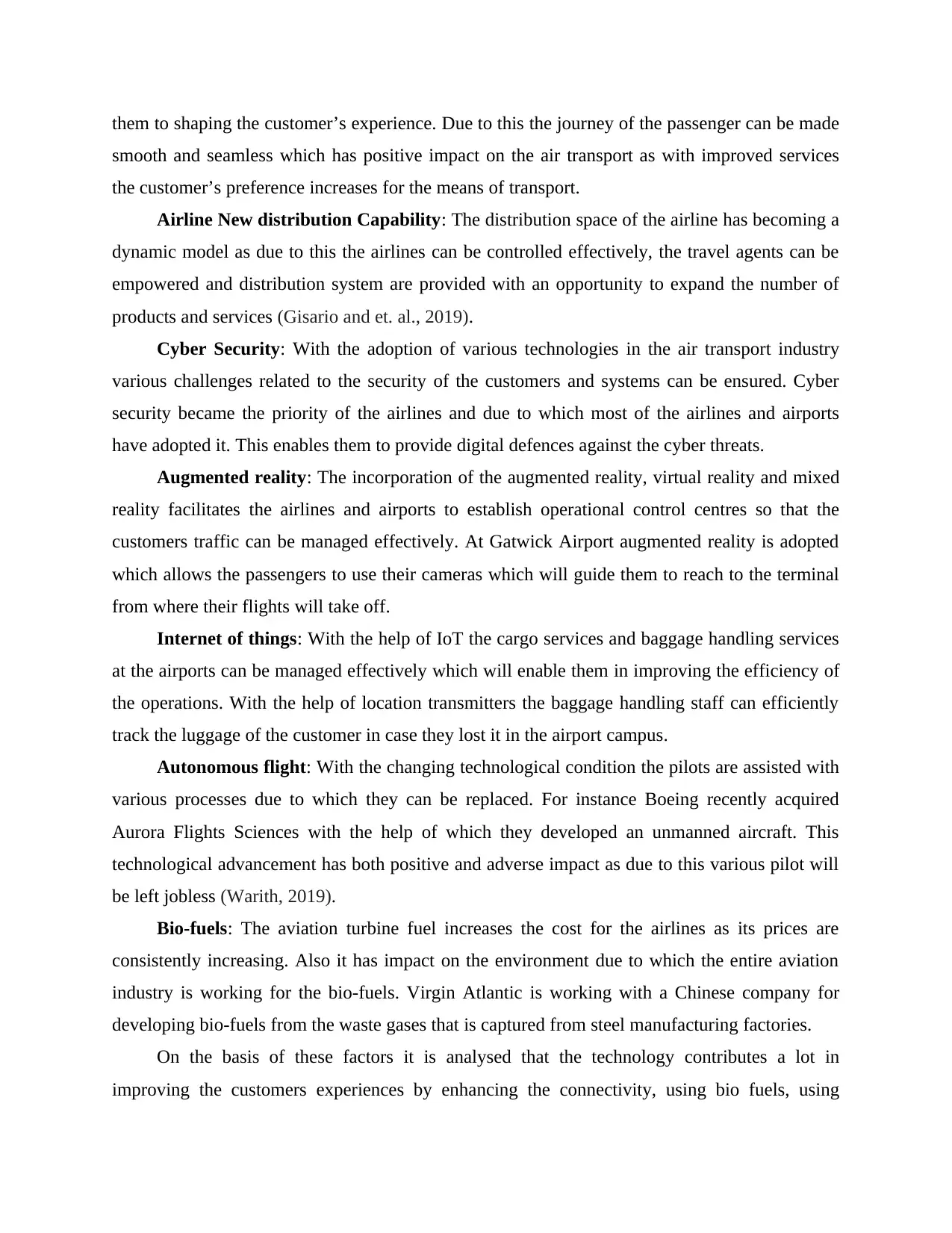
them to shaping the customer’s experience. Due to this the journey of the passenger can be made
smooth and seamless which has positive impact on the air transport as with improved services
the customer’s preference increases for the means of transport.
Airline New distribution Capability: The distribution space of the airline has becoming a
dynamic model as due to this the airlines can be controlled effectively, the travel agents can be
empowered and distribution system are provided with an opportunity to expand the number of
products and services (Gisario and et. al., 2019).
Cyber Security: With the adoption of various technologies in the air transport industry
various challenges related to the security of the customers and systems can be ensured. Cyber
security became the priority of the airlines and due to which most of the airlines and airports
have adopted it. This enables them to provide digital defences against the cyber threats.
Augmented reality: The incorporation of the augmented reality, virtual reality and mixed
reality facilitates the airlines and airports to establish operational control centres so that the
customers traffic can be managed effectively. At Gatwick Airport augmented reality is adopted
which allows the passengers to use their cameras which will guide them to reach to the terminal
from where their flights will take off.
Internet of things: With the help of IoT the cargo services and baggage handling services
at the airports can be managed effectively which will enable them in improving the efficiency of
the operations. With the help of location transmitters the baggage handling staff can efficiently
track the luggage of the customer in case they lost it in the airport campus.
Autonomous flight: With the changing technological condition the pilots are assisted with
various processes due to which they can be replaced. For instance Boeing recently acquired
Aurora Flights Sciences with the help of which they developed an unmanned aircraft. This
technological advancement has both positive and adverse impact as due to this various pilot will
be left jobless (Warith, 2019).
Bio-fuels: The aviation turbine fuel increases the cost for the airlines as its prices are
consistently increasing. Also it has impact on the environment due to which the entire aviation
industry is working for the bio-fuels. Virgin Atlantic is working with a Chinese company for
developing bio-fuels from the waste gases that is captured from steel manufacturing factories.
On the basis of these factors it is analysed that the technology contributes a lot in
improving the customers experiences by enhancing the connectivity, using bio fuels, using
smooth and seamless which has positive impact on the air transport as with improved services
the customer’s preference increases for the means of transport.
Airline New distribution Capability: The distribution space of the airline has becoming a
dynamic model as due to this the airlines can be controlled effectively, the travel agents can be
empowered and distribution system are provided with an opportunity to expand the number of
products and services (Gisario and et. al., 2019).
Cyber Security: With the adoption of various technologies in the air transport industry
various challenges related to the security of the customers and systems can be ensured. Cyber
security became the priority of the airlines and due to which most of the airlines and airports
have adopted it. This enables them to provide digital defences against the cyber threats.
Augmented reality: The incorporation of the augmented reality, virtual reality and mixed
reality facilitates the airlines and airports to establish operational control centres so that the
customers traffic can be managed effectively. At Gatwick Airport augmented reality is adopted
which allows the passengers to use their cameras which will guide them to reach to the terminal
from where their flights will take off.
Internet of things: With the help of IoT the cargo services and baggage handling services
at the airports can be managed effectively which will enable them in improving the efficiency of
the operations. With the help of location transmitters the baggage handling staff can efficiently
track the luggage of the customer in case they lost it in the airport campus.
Autonomous flight: With the changing technological condition the pilots are assisted with
various processes due to which they can be replaced. For instance Boeing recently acquired
Aurora Flights Sciences with the help of which they developed an unmanned aircraft. This
technological advancement has both positive and adverse impact as due to this various pilot will
be left jobless (Warith, 2019).
Bio-fuels: The aviation turbine fuel increases the cost for the airlines as its prices are
consistently increasing. Also it has impact on the environment due to which the entire aviation
industry is working for the bio-fuels. Virgin Atlantic is working with a Chinese company for
developing bio-fuels from the waste gases that is captured from steel manufacturing factories.
On the basis of these factors it is analysed that the technology contributes a lot in
improving the customers experiences by enhancing the connectivity, using bio fuels, using
Paraphrase This Document
Need a fresh take? Get an instant paraphrase of this document with our AI Paraphraser
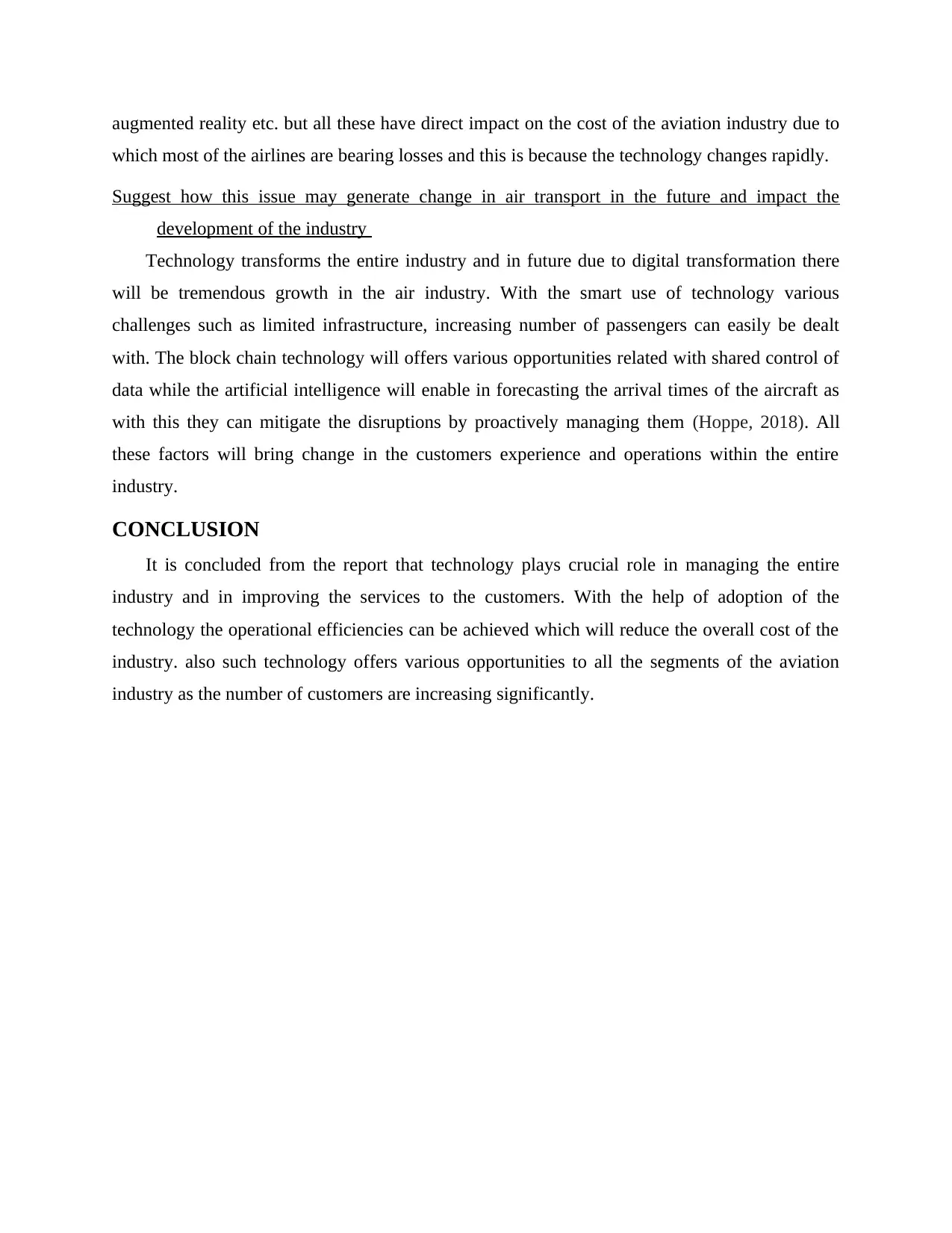
augmented reality etc. but all these have direct impact on the cost of the aviation industry due to
which most of the airlines are bearing losses and this is because the technology changes rapidly.
Suggest how this issue may generate change in air transport in the future and impact the
development of the industry
Technology transforms the entire industry and in future due to digital transformation there
will be tremendous growth in the air industry. With the smart use of technology various
challenges such as limited infrastructure, increasing number of passengers can easily be dealt
with. The block chain technology will offers various opportunities related with shared control of
data while the artificial intelligence will enable in forecasting the arrival times of the aircraft as
with this they can mitigate the disruptions by proactively managing them (Hoppe, 2018). All
these factors will bring change in the customers experience and operations within the entire
industry.
CONCLUSION
It is concluded from the report that technology plays crucial role in managing the entire
industry and in improving the services to the customers. With the help of adoption of the
technology the operational efficiencies can be achieved which will reduce the overall cost of the
industry. also such technology offers various opportunities to all the segments of the aviation
industry as the number of customers are increasing significantly.
which most of the airlines are bearing losses and this is because the technology changes rapidly.
Suggest how this issue may generate change in air transport in the future and impact the
development of the industry
Technology transforms the entire industry and in future due to digital transformation there
will be tremendous growth in the air industry. With the smart use of technology various
challenges such as limited infrastructure, increasing number of passengers can easily be dealt
with. The block chain technology will offers various opportunities related with shared control of
data while the artificial intelligence will enable in forecasting the arrival times of the aircraft as
with this they can mitigate the disruptions by proactively managing them (Hoppe, 2018). All
these factors will bring change in the customers experience and operations within the entire
industry.
CONCLUSION
It is concluded from the report that technology plays crucial role in managing the entire
industry and in improving the services to the customers. With the help of adoption of the
technology the operational efficiencies can be achieved which will reduce the overall cost of the
industry. also such technology offers various opportunities to all the segments of the aviation
industry as the number of customers are increasing significantly.
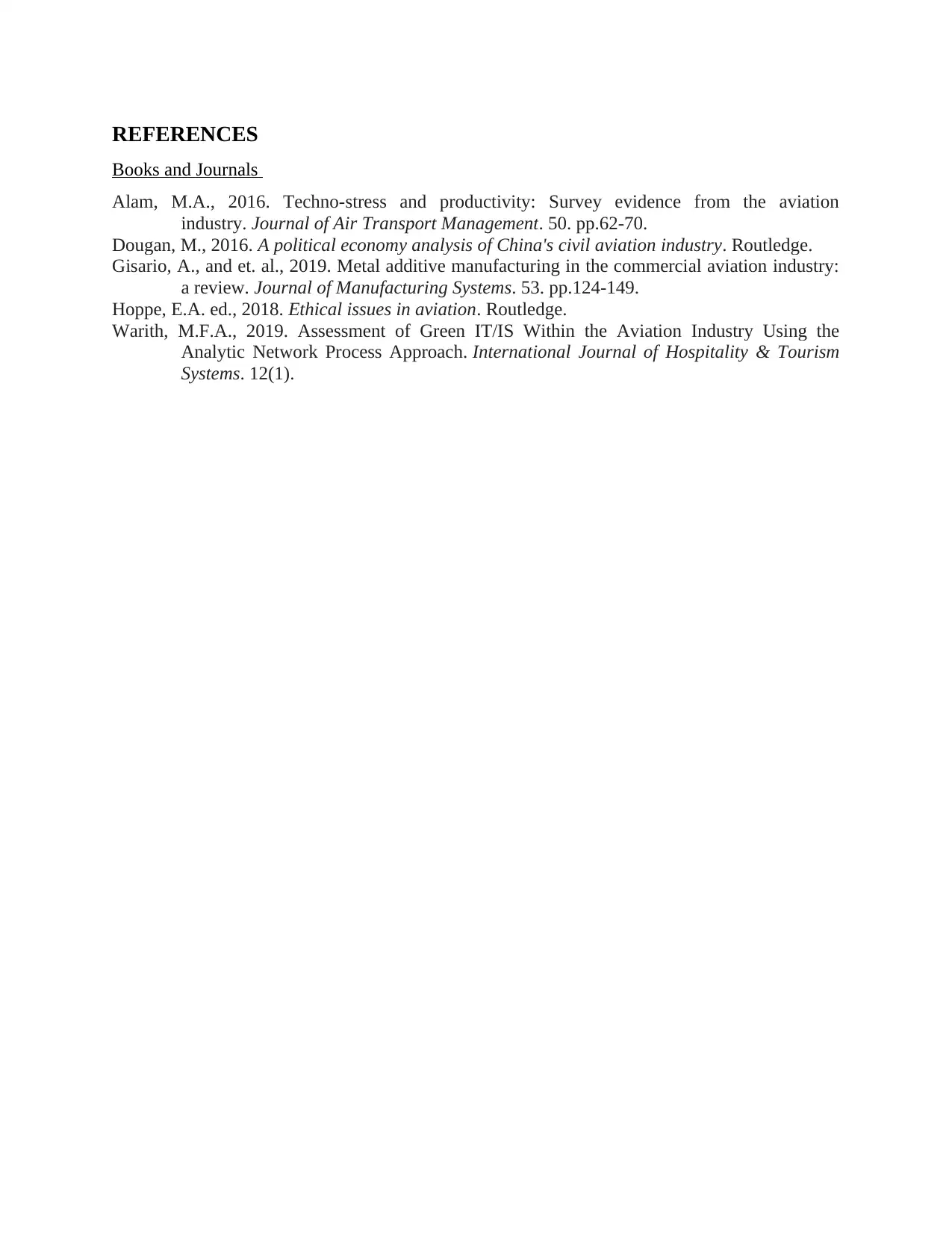
REFERENCES
Books and Journals
Alam, M.A., 2016. Techno-stress and productivity: Survey evidence from the aviation
industry. Journal of Air Transport Management. 50. pp.62-70.
Dougan, M., 2016. A political economy analysis of China's civil aviation industry. Routledge.
Gisario, A., and et. al., 2019. Metal additive manufacturing in the commercial aviation industry:
a review. Journal of Manufacturing Systems. 53. pp.124-149.
Hoppe, E.A. ed., 2018. Ethical issues in aviation. Routledge.
Warith, M.F.A., 2019. Assessment of Green IT/IS Within the Aviation Industry Using the
Analytic Network Process Approach. International Journal of Hospitality & Tourism
Systems. 12(1).
Books and Journals
Alam, M.A., 2016. Techno-stress and productivity: Survey evidence from the aviation
industry. Journal of Air Transport Management. 50. pp.62-70.
Dougan, M., 2016. A political economy analysis of China's civil aviation industry. Routledge.
Gisario, A., and et. al., 2019. Metal additive manufacturing in the commercial aviation industry:
a review. Journal of Manufacturing Systems. 53. pp.124-149.
Hoppe, E.A. ed., 2018. Ethical issues in aviation. Routledge.
Warith, M.F.A., 2019. Assessment of Green IT/IS Within the Aviation Industry Using the
Analytic Network Process Approach. International Journal of Hospitality & Tourism
Systems. 12(1).
⊘ This is a preview!⊘
Do you want full access?
Subscribe today to unlock all pages.

Trusted by 1+ million students worldwide
1 out of 6
Related Documents
Your All-in-One AI-Powered Toolkit for Academic Success.
+13062052269
info@desklib.com
Available 24*7 on WhatsApp / Email
![[object Object]](/_next/static/media/star-bottom.7253800d.svg)
Unlock your academic potential
Copyright © 2020–2026 A2Z Services. All Rights Reserved. Developed and managed by ZUCOL.





